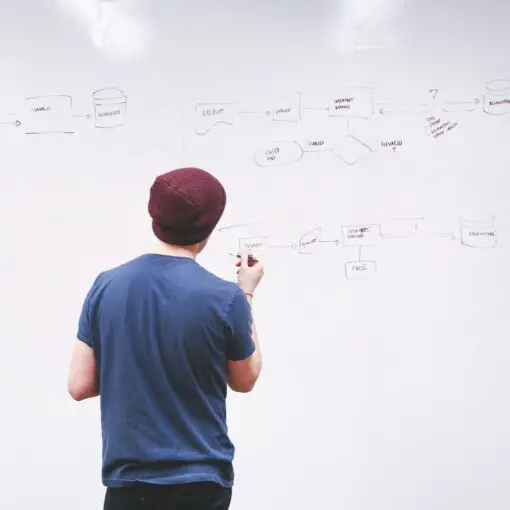Perhaps you have heard of the term critical thinking and you may have probably been evaluated on with that in school or when you were applying for a job. However, the issue is not all people really understand what it is.
Critical thinking skills are studied and perfected over time. So, what is critical thinking, really? How can you develop critical thinking? This allows you to process and handle information more efficiently and aid you in decision making. Refining your critical thinking skills give you that certain boost in your career and life as a whole.
Critical thinking is all about thoroughly analyzing, handling, and making sense of every bit of information thrown at you. While it has often been regarded as part of philosophy and associated with the likes of Aristotle and Plato, critical thinking can be best applied to concepts, problem solving, decision making and questions.
How can you sort the cream of the crop from the chaff? One surefire way to do this is to learn by thinking critically. It is a kind of thinking that allows you to contemplate a bit more to be a tad closer to the best and most appropriate decision.
So, the next time you are confronted with a problem to solve that requires careful planning and decision, try critical thinking and you will be amazed with the outcome. This guide will help you have a better understanding of what it really is and ways to progress and hone this skill.
Be mindful of your thought process
A genuine critical thinker makes time for a good number of self-reflection. In general, you have to be aware of your own mental thought flow – what it looks like, where it commenced, and where it’s headed. The human brain is such an amazing part of the body that can sift through and examine information at a remarkable level. Being smart doesn’t necessarily equate that you are a critical thinker. But when you are one, you develop a habit of inquiring to yourself your assumptions, you become more mindful of your biases, and check for things like typecasting.
Acquire good foresight
This does not mean to say that you’re already prophesying the future and not living at the moment as what most life professionals would suggest, but you’re only calculating your actions and their possible consequences. In truth, having the ability to foresight is considered an advantage in critical thinking because you are better off at coming to the right decision if you are prepared for what might happen in the future. You have already studied the possible consequences of your actions and have already looked at the potentials. Don’t just rely on your gut feeling when making decisions. If you are a genuine critical thinker, you will carefully study of the possible impacts and even the disadvantages of your every decision in your life.
Ask the most basic of questions
You have probably thought that critical thinkers are the people who often ask scholarly, complex questions when they are trying to solve a problem. But, this is not actually the case. Essentially, it is the opposite. The more genuine you are at being a critical thinker, all the more that you ask the most vivid and basic questions. To do this, you must break your questions down. Let’s say you have encountered a problem at work and you don’t know what to do. Ask the following basic questions:
- What information do I have at hand?
- How did I acquire such information?
- What are my goals and what am I trying to prove, support, understand, and discover?
- Are there things that I may have overlooked?
These questions let you break down the problem and scrutinize its root cause. So make the habit of asking basic questions first before assuming difficulty.
Try reverse thinking
This is another amazing technique if you want to develop critical thinking skills. This is especially beneficial when you are trying to solve a challenging problem. The basic concept here is to try to overturn what is on your mind. So if you generally think that X causes Y, why not think what if Y caused X? This is akin to the mystery of who came first, the chicken or the egg?
Reverse thinking may not always give you an instant answer to your problems, but it gets you out of thinking the problem the old way. This ironically is often what you need to succeed. Overturning the supposed path of causation is a predominantly practical trick in solving problems.
Contemplate on the motive
Imagine this scenario: You got a message from a lending company saying that your application is pre-approved and you’re entitled to get a higher amount of loan with lower interest rates and longer repayment terms. If you are a critical thinker, you will instantly question the motive behind the message. Why are they offering you this? Look behind the motive and analyze if it will work best for you or will only add up to your bills. Ideally, you must learn to evaluate information and make a good decision to either act or just shrug it off.
Adjust your viewpoint
As mentioned, being analytical and more aware of your biases is an effective way to hone your critical thinking skills, but it’s just another step in slowly shifting your perspective. You can also try to bare your mind to other areas of thinking. Pick up books instead of constantly reading sources online. Read the newspaper instead of relying on your social media feeds for daily news. These simple actions make for a better critical thinker.
Become your own self-critic
This is perhaps the most important of all ways, you must be your own criticizer and evaluator of your actions and thoughts. When you learn to reflect on your own thoughts, assess, and clarify information at hand, you begin to find a logic solution to your problems. Being a self-critic also allows you to acknowledge your personal preferences, strengths, biases, and even your weaknesses. When you know yourself, it is easier to understand the kind of approach you have in every pressing situation and why you approach it from this particular perspective.
Peaceful communication is key
You can only apply your critical thinking skill if you know how to communicate in a peaceful, productive way. When analyzing disputes, you should have the capacity to identify valid logic. And then, connect with others in a constructive way. Peaceful communication is all about observation and empathy. When a situation is tackled with these positive traits, you are already in a serene state of mind rather than approaching the situation in a defensive one.
Also, it would help a great deal if you learn how to separate your feelings from an idea. Just because a person did not acknowledge your idea does not mean he doesn’t like you. Approach a situation with an open mind with the focus of facing the situation and taking the necessary step towards finding a solution.
Listen attentively
A genuine critical thinker knows how to attentively listen to others’ opinions, ideas, criticisms, and arguments. They take the time to have their undivided attention on what other people are saying. They also regard every information as important. Nothing is less and nothing is superior.
Also, it is by actively listening that you also feel compassion. You hear other people’s stories, passions, struggles, victories, and even defeats. You are able to relate to them and understand them more.
Scrutinize your decision numerous times
Since dispute has a propensity to be more to validate a situation rather than have the correct judgement, one way to get around this is to attack the situation with numerous possible decisions at hand. Once you have already scrutinized the possible effects of your decision, choose the most valid and favorable one. Doing so will help alleviate further damages to an already pressing situation. Using critical thinking skills in this kind of situation opens you up to many different promising solutions you did not think are all possible.
These are just 10 of the many ways you can do to develop critical thinking skills. It may not be easy, but it can be learned. Critical thinking encompasses embracing a whole new loads of information and liberating what you desire to believe. Things may get rough and uncomfortable at first, but it also is motivating and even thought-provoking.
Critical thinking helps in making you come up with the most accurate decisions. It helps you think things thoroughly and meticulously. You do not just jump right into conclusion, but you also weigh the consequences. That’s what a critical thinker does. Should you buy a new car? Go keto? Eat paleo? Start a new business? Resign from your job? Each decision that you make and when thought of critically can make a huge difference and impact in your life. So, why is critical thinking skills important? It makes for sound decisions in life.





